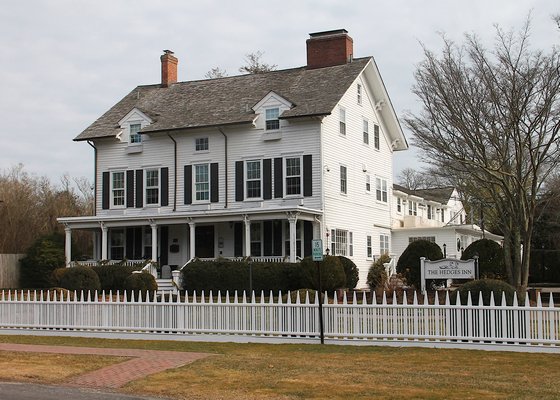
A state judge has thrown out an East Hampton Village law that prohibited inns and restaurants from having tented weddings and other special events and seemingly targeted the Hedges Inn specifically at the behest of neighbors.
In her decision, New York State Supreme Court Justice Martha Luft declared the law invalid because it effectively imposed a zoning restriction on one type of property that was not imposed on other properties within the same zoning district.
The law barred inns and restaurants from applying to the village for a special event permit to allow outdoor dining under a tent on the property for a single event, but did not make the same limitation on adjacent residential properties or even other non-residential properties in the same area, the judge noted.
Attorneys for the owners of the Hedges Inn, which filed the lawsuit soon after the law was enacted in October 2018, had spotlighted that the village had continued to grant special events permits to nearby churches, the East Hampton Library and the East Hampton Historical Society for outdoor events right up the street from the Hedges.
“Even if a rational basis might exist for treating residential property differently from non-residential property, the respondents have articulated no basis — rational or otherwise — for distinguishing certain non-residential property from other non-residential property,” Judge Luft wrote in her decision, finding the law is “invalid and unenforceable.”
The lawsuit was born after the village denied the Hedges Inn four special events permits it had requested for weddings in 2018. In denying the permits, the village said that such events constituted an unlawful expansion of the inn’s restaurant to an outdoor patio. The denial referenced a 2006 court ruling that had barred the former James Lane Cafe, a restaurant owned by The Palm steakhouse chain that operated in the Hedges Inn’s restaurant space in the late 1990s and early 2000s, from using an outdoor patio for outdoor dining. But the Hedges operators noted that the James Lane Cafe had made the patio essentially a permanent part of the restaurant and that the inn’s special event permits were for a different area of the property and were only for temporary one-day use each.
In the law adopted later that year, the village declared outdoor tents at inns and restaurants to be an expansion of a “pre-existing, non-conforming” use, which is not allowed.
The lawsuit accused the Village Board of having crafted the law to specifically target the Hedges Inn at the behest of the inn’s neighbors, Patricia and Peter Handal, who were also a party to the lawsuit.
An attorney for the Handals, Anthony Pasca, declined to comment on Judge Luft’s decision or whether an appeal should be expected.
Chris Kelley, the attorney for the Hedges said that Judge Luft had rightly accepted his argument that the village law was essentially a zoning amendment that imposed imbalanced restrictions.
“We were singled out for unequal treatment,” Mr. Kelley said. “You can’t say to a residential property that they can have 21 days of special events but their neighbor that happens to be a hotel can’t have any events at all.
In addition to throwing out the law, Judge Luft also allowed that the Hedges Inn may seek damages for lost revenue during the time when they were prevented from holding special events. Mr. Kelley said that his clients have yet to calculate what the damages they might claim would be.